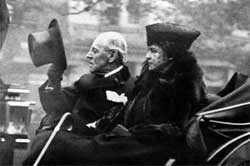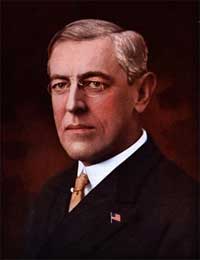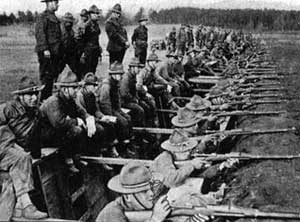| Thomas Woodrow Wilson, the twenty-eighth President of the United States (1913-1921) guided the country through The First World War. A Democrat, Wilson was elected to the US presidency in 1912 after having served as president of his alma mater Princeton University (formerly The College of New Jersey) and as Governor of New Jersey (1910).

Wilson was born on December 28, 1856, in Staunton, Virginia. His father was a Presbyterian minister and his mother was the daughter of a minister. He married Ellen Louise Axson and authored several books on the government, history, economics, and the US Congress. His first book, Congressional Government, was published in 1885.

 Wilson studied law, but only practiced for a year before returning to college at Johns Hopkins University, where, in 1886, he got a Ph.D. in political science. Wilson was a noted scholar and lecturer, who taught at Bryn Mawr College and Wesleyan University before becoming a professor of jurisprudence and political economy at Princeton. In 1902 he became President of Princeton and reorganized the curriculum and the undergraduate program; however the wealthy alumni and trustees defeated many of his proposed changes to the college. In 1920, he was elected Governor of New Jersey. As Governor, he broke the control of the party bosses and supported bills dealing with election reform, workmen's compensation, and creating a Public Utilities Commission to combat monopolies. Wilson studied law, but only practiced for a year before returning to college at Johns Hopkins University, where, in 1886, he got a Ph.D. in political science. Wilson was a noted scholar and lecturer, who taught at Bryn Mawr College and Wesleyan University before becoming a professor of jurisprudence and political economy at Princeton. In 1902 he became President of Princeton and reorganized the curriculum and the undergraduate program; however the wealthy alumni and trustees defeated many of his proposed changes to the college. In 1920, he was elected Governor of New Jersey. As Governor, he broke the control of the party bosses and supported bills dealing with election reform, workmen's compensation, and creating a Public Utilities Commission to combat monopolies.

 The Democratic Party nominated him for the presidency in 1912. After 46 ballots he defeated the Speaker of the House, Champs Clark. When the Republican vote was split between William Howard Taft and Theodore Roosevelt, Wilson easily won the general election. The Democratic Party nominated him for the presidency in 1912. After 46 ballots he defeated the Speaker of the House, Champs Clark. When the Republican vote was split between William Howard Taft and Theodore Roosevelt, Wilson easily won the general election.
One of the primary goals of his presidency was to regulate big business. With his programs nicknamed "New Freedom" the all-Democratic Congress easily passed them. The Federal Reserve System and the Federal Trade Commission were established. The Federal Reserve Act established a new system to support finance and banking. The Clayton Antitrust Act of 1914 established an Antitrust Commission with broad powers to enforce laws that further limited the power of large corporations. The Underwood Tariff Act lowered tariffs on imported goods for the first time in forty years, which stimulated foreign trade. Also during Woodrow Wilson's first term, the Federal Farm Loan Act was passed, as was a law giving railroad workers an eight-hour day. During the first Wilson term, Louis Brandeis was appointed the first Jewish member of the Supreme Court
Wilson's skill in foreign was tested when instability in the Mexican government was seen as threatening to American interests there. General Victoriano Huerta, the man seen as most supportive of American business interests in Mexico, had seized power illegally, so Wilson refused to acknowledge his government. After an incident at sea and the discovery of a German ship delivering ammunition to Mexico, Wilson intervened, and briefly had hopes regarding the Mexican bandit Pancho Villa, who ultimately turned on him. The situation was ultimately resolved, but it was not one of Wilson's finer moments.
 Wilson had maintained a neutral position when World War I broke out in Europe in 1914. He saw it as an imperialistic conflict between European monarchs, and thought the United States should have no part in it. In January of 1915 Wilson warned Germany, telling them that they would be accountable for the loss of any American lives. The British passenger liner the LUSITANIA was sunk in May of 1915 and 128 American lives were lost, but still Wilson did not join the fray. Instead he asked Germany to respect American shipping as neutral, a request they honored for a while. Wilson did his best to end the War through diplomatic means, sending a trusted advisor, Colonel Edward House, abroad to explore a peaceful end to the conflict in secret meetings with the German and British governments. In 1916, he made a public appeal for "peace without victory". Wilson had maintained a neutral position when World War I broke out in Europe in 1914. He saw it as an imperialistic conflict between European monarchs, and thought the United States should have no part in it. In January of 1915 Wilson warned Germany, telling them that they would be accountable for the loss of any American lives. The British passenger liner the LUSITANIA was sunk in May of 1915 and 128 American lives were lost, but still Wilson did not join the fray. Instead he asked Germany to respect American shipping as neutral, a request they honored for a while. Wilson did his best to end the War through diplomatic means, sending a trusted advisor, Colonel Edward House, abroad to explore a peaceful end to the conflict in secret meetings with the German and British governments. In 1916, he made a public appeal for "peace without victory".
President Wilson was up for reelection during these trying political times. He ran on the slogan "He kept us out of war." In 1916 he defeated Republican opponent Charles Evans Hughes by one of the narrowest victories in history. The election came down to California, which Wilson won by 1500 votes, and thus gathered enough electoral votes to win.
Finally, when Germany resumed unrestricted submarine warfare and attempted to make an alliance with Mexico, Wilson severed diplomatic relations with the Axis Powers. On April 6, l917, at Wilson's request, Congress declared war on Germany, rallying the country around the slogan "the world must be made safe for democracy." Large armies were raised; food and fuel were rationed; industry and labor were organized; railroads were taken over by the Federal Government; public opinion and civil liberties were curtailed. In May of 1917, Congress approved The Selective Service Act, which empowered him to draft 2.8 million Americans into the countries' armed forces. He also sought and was given broader Presidential powers for the duration of the war. A War Commission Board restricted production to war supplies. Woodrow Wilson instituted the first federal income tax since the Civil War.
On June 28, l919 the Treaty of Versailles was signed, ending World War One. Wilson set out his plan for the implementation of peace in his famous Fourteen Points. An important point was an organization of nations to enforce peace. This was the beginning of the League of Nations, forerunner of the United Nations. Surprisingly, the Senate refused to allow the United States to join the League. When Wilson returned from France, the Congress refused to ratify the treaty. Wilson responded by embarking upon a personal campaign to win public support for the League of Nations. On his way back to Washington after a journey of 8,000 miles during which he delivered over forty speeches, Wilson suffered a stroke from which he never recovered. At the time of Wilson's stroke, three months of his term remained. His wife kept the truth about his condition from the public by taking over Presidential duties herself.
In 1919 Woodrow Wilson was awarded the Nobel Peace Prize for his efforts. Congress refused to allow the United States to join the League and never did ratify the Treaty of Versailles. Wilson died on February 3, 1924.
|

